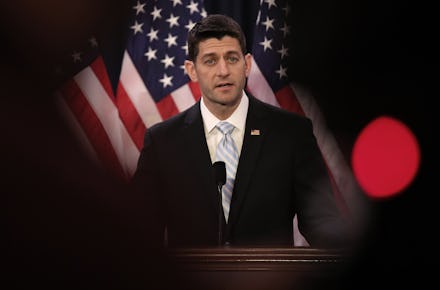Paul Ryan Apologizes for Calling Poor People "Takers"

On Wednesday, House Speaker Paul Ryan (R-Wisc.) spoke to a group of congressional interns on Capitol Hill. But the remarks he made were intended for a national audience — a grand public reflection on what he perceives to be a decline in the state of American political discourse, which he linked to the rise of Donald Trump without mentioning him by name.
Ryan argued that how we speak to each other matters, especially in times of extreme polarization. He lamented how the young interns in the audience were too young to remember when politicians "disagreed without being disagreeable."
Read more: Ted Cruz Says Police Should Patrol Muslim Neighborhoods After Brussels Attacks
Ryan, the 2012 Republican vice presidential nominee and the most powerful Republican in Congress, offered what amounted to an apology for his own past statements:
There was a time that I would talk about a difference between "makers" and "takers" in our country, referring to people who accepted government benefits. But as I spent more time listening, and really learning the root causes of poverty, I realized something. I realized that I was wrong. "Takers" wasn't how to refer to a single mom stuck in a poverty trap, trying to take care of her family. Most people don't want to be dependent. And to label a whole group of Americans that way was wrong. I shouldn't castigate a large group of Americans just to make a point.
Ryan detailed his own shortcomings in order to draw a line between himself and a certain billionaire who could be the Republican nominee for president.
"I didn't come out and say [it was wrong to label Americans as takers] to be politically correct," Ryan said. "I say this because I was just wrong."
How is that a nod to Trump? After all, Trump himself once excoriated Mitt Romney for his infamous "47%" comments about "people who are dependent on government," which emanated from the same makers-versus-takers worldview. The answer lies in his use of the words "politically correct."
Trump has made attacking political correctness one of the fundamental traits of his presidential platform, lambasting the idea as a distraction to frank discussion of from everything from immigration to national security. Reveling in his constant violation of mainstream norms surrounding the discussion of issues like race, gender and violence, he's argued repeatedly that being politically correct prevents straightforward conversation about the country's most pressing problems.
But Ryan's speech was basically a lengthy defense of the idea that language that conveys respect and inclusiveness matters — and matters a lot. He thinks that disparaging language has actual consequences in how people relate to each other, and that it distracts from the real purpose of political exchange. He thinks politics is meant to be "a battle of ideas, not insults."
Ryan never mentioned Trump by name during the speech, but it was clear that his criticism of personality-driven politics which involve "playing to your anxieties" was targeted at the candidate.
While Trump's inflammatory rhetoric against minorities such as Muslims and undocumented immigrants during his campaign has crossed a line that most prominent Republicans have been unwilling to cross, there's something to be said for the fact that many of them have held similar policy ideas to him for quite some time. They were just better at presenting it in more polite language.